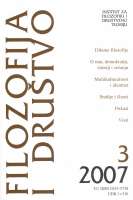O čemu govorimo kada ćutimo i o čemu ćutimo kada govorimo? – Polazne pretpostavke za antropologiju ćutanja o najbiližoj prošlosti
Things Talked About While We Remain Silence and Things We’re Silence About While Talking - The Starting Assumptions for an Anthropology of Silence Abo
Author(s): Gordana ĐerićSubject(s): History
Published by: Institut za filozofiju i društvenu teoriju
Keywords: silence; forgetting; social memory; wars in former Yugoslavia; Storm;
Summary/Abstract: Wars of the last decade of the 20th century in former Yugoslavia have brought the whole region into the centre of media attention and, accordingly, have aroused interest of the western academic theory. Since the latest ’discovery of the Balkans’ was brought into being precisely due to wars, one shouldn’t be surprised to find that many academic approaches to questions of Yugoslavia dismemberment are biased, superficial or exotic. On the other hand, Serbian academic auditorium was far from being active in elaborating questions of its own contemporality and closest past - for various reasons, but mostly because of its detachment from systematic explorations. Thus, acknowledgement and presentations of mentioned issues were left to be the job of media, publicists, others outside of academic community or were left to be treated in the time to come. Domestic scholars were rarely intrigued to deal with these matters, despite the fact that images of recent wars were oftenly built on stereotypes and propaganda and that the formed knowledge of the entire subject suffered from severe simplification. The themes of great violence were particularly avoided which left some of the crucial war events out of the academic focus – the reason being, very probably, the estimation that what made Serbia and the region worldwide known is best to be forgotten. Contemporary academic silence on recent wars, in retrospection, could easily be placed within the continuum of silence during the socialist period and war which preceded it. Having all mentioned in mind, this paper not only investigates reasons for avoiding the issues of the nearest past and influences of silence in socialism on what came afterwards, but also highlights the importance of exploring semantics and functions of silence and silencing in recent wars, as well as the relationship between silence and social memory constructions.
Journal: Filozofija i društvo
- Issue Year: 2007
- Issue No: 34
- Page Range: 43-59
- Page Count: 17
- Language: Serbian

